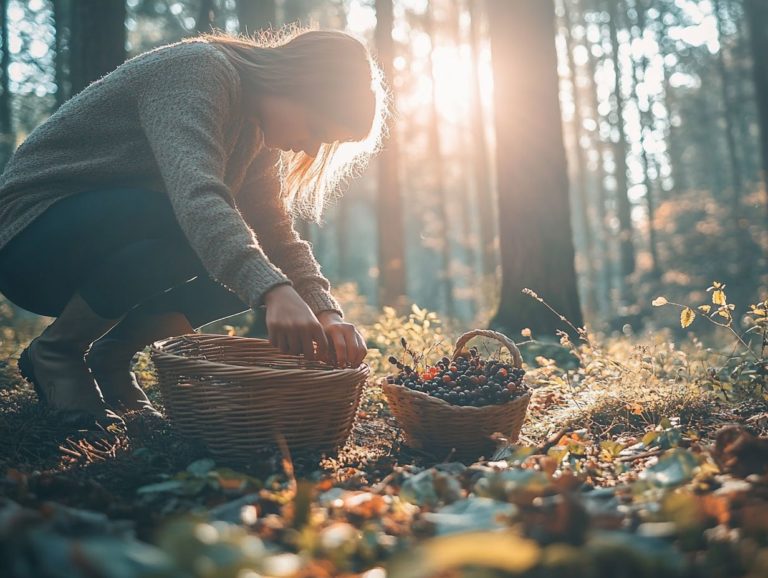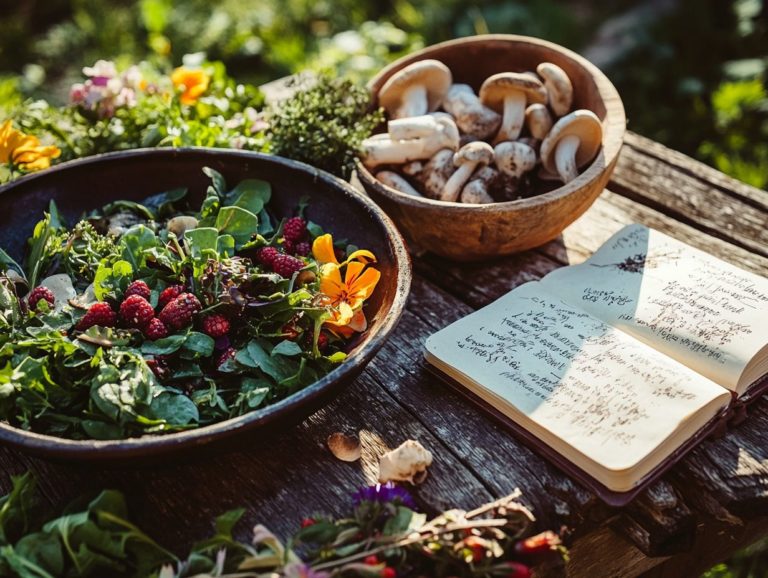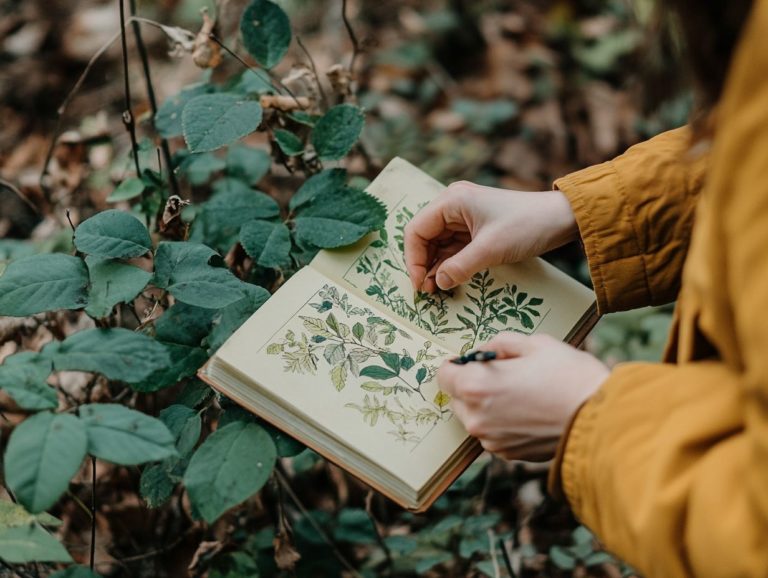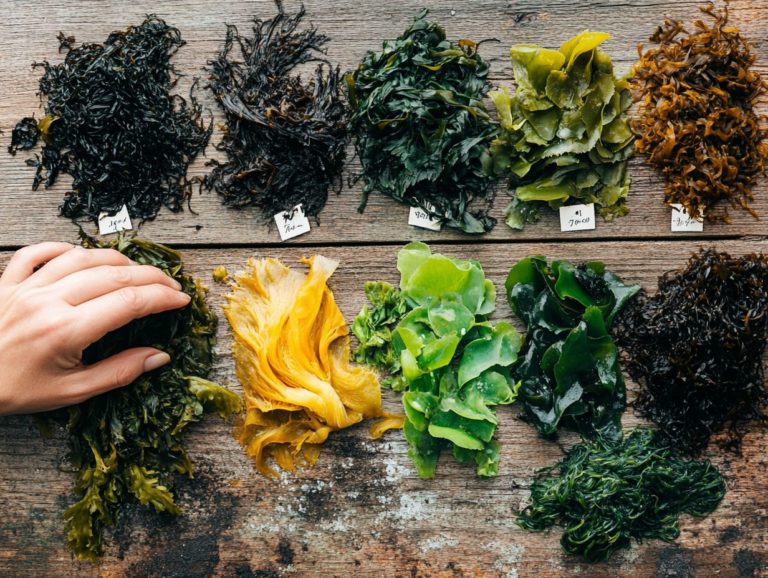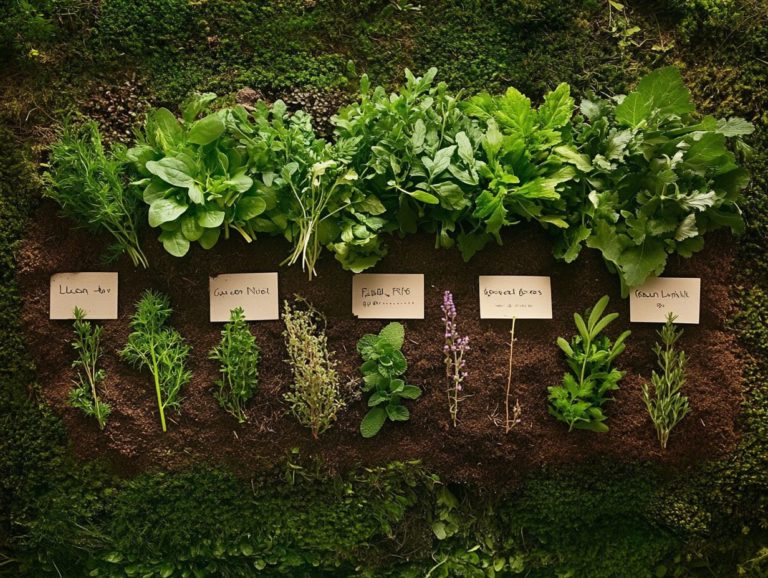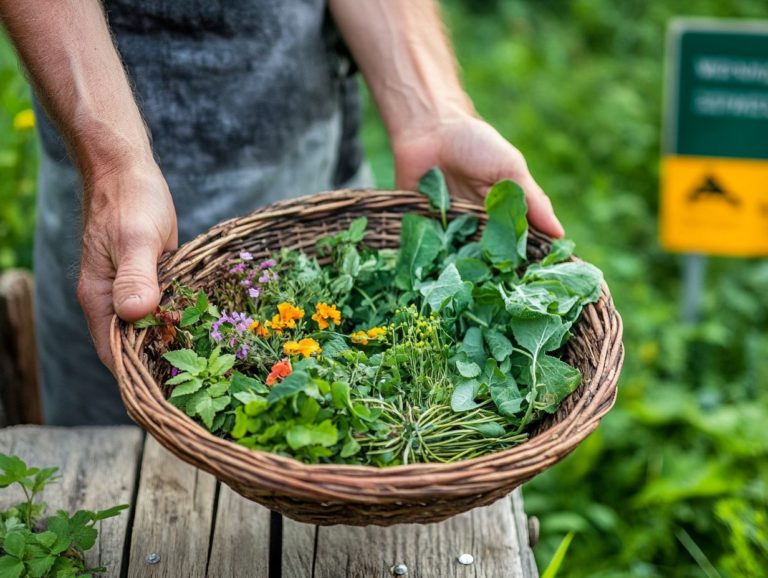How to Share Foraging Knowledge with Others?
Foraging is more than just collecting food; it is a rich tradition that deepens your connection to nature and supports community bonds.
Sharing your foraging knowledge is essential for preserving these practices and cultivating connections. You ll discover effective methods to disseminate this invaluable wisdom, from engaging teaching workshops and comprehensive online resources to vibrant community foraging events.
Tackle challenges like misinformation and accessibility head-on, while also considering ethical implications that ensure respectful practices.
Seize the chance to empower others by sharing your foraging skills!
Contents
- Key Takeaways:
- The Importance of Sharing Foraging Knowledge
- Methods for Sharing Foraging Knowledge
- Challenges and Solutions for Sharing Foraging Knowledge
- Ethical Considerations for Sharing Foraging Knowledge
- Frequently Asked Questions
- What is foraging knowledge?
- Why is it important to share foraging knowledge with others?
- How can I effectively share foraging knowledge with others?
- What are some tips for teaching foraging knowledge to beginners?
- How can I ensure that the foraging knowledge I share is accurate?
- What are some potential risks of sharing foraging knowledge with others?
Key Takeaways:
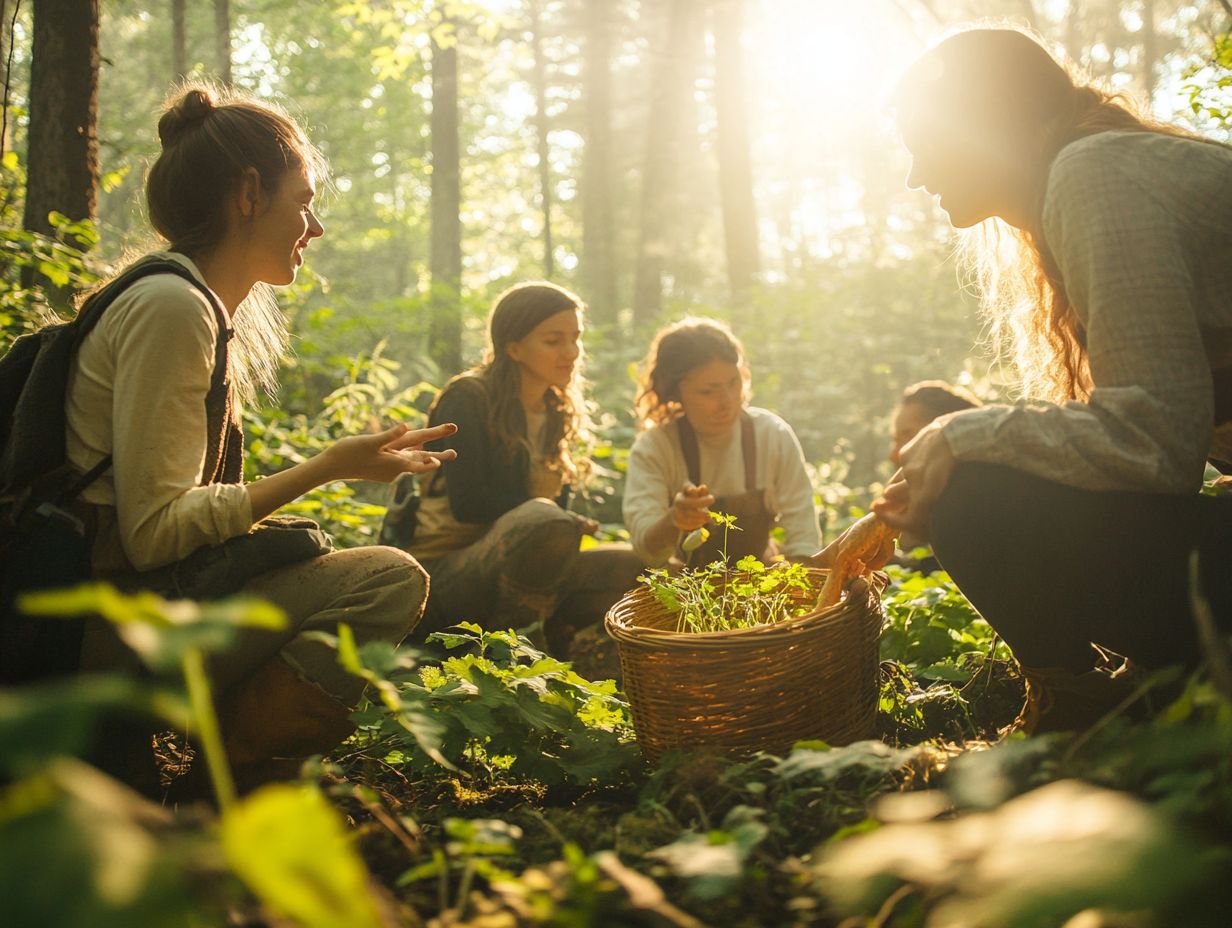
- Sharing foraging knowledge preserves traditional practices and builds community connections.
- Methods for sharing include teaching workshops and organizing community events.
- Challenges in sharing include accessibility barriers and addressing misinformation and safety concerns. Ethical considerations involve respecting indigenous knowledge and sustainable foraging practices.
Start sharing your foraging knowledge today!
The Importance of Sharing Foraging Knowledge
Sharing foraging knowledge is essential for cultivating a community that cherishes the rich traditions surrounding wild plants and sustainable practices. Learning how to share your foraging skills deepens your personal connection with nature, allowing you to explore activities like cooking with plants and discovering edible species.
This practice safeguards traditional food sources and enhances your understanding of local ecosystems and the nutritional benefits of wild edibles. Connecting with local herbalists and taking herbalism courses can empower you to embark on your own foraging journey while championing the sustainability of plant communities.
Preserving Traditional Practices
Preserving traditional practices in foraging requires grasping the historical significance of gathering wild food and its vital role in maintaining cultural heritage and biodiversity. This knowledge supports our cultural heritage and helps preserve biodiversity.
Today s foragers are uncovering the nutritional treasures of wild edibles. Take dandelions, for instance; their bitter greens can elevate your salads, while ramps add a delightful garlicky punch to various dishes, showcasing the diversity of wild food. Consider elderberries, with their rich, tangy flavor, which can be transformed into luscious syrups or jams, seamlessly bridging the past with contemporary culinary trends.
By incorporating these foraged ingredients into your modern cooking endeavors, you can celebrate nature s bounty and cultivate a deeper appreciation for the ecosystems that surround you.
Building Community and Connections
Building a foraging community allows you to forge connections with others who share your passion for wild food, boosting cooperative efforts through local events and initiatives.
These gatherings deepen your relationships and create valuable opportunities for knowledge exchange. You can gain insights into seasonal foraging practices and sustainable harvesting methods that truly enrich your experience. By participating in workshops, foraging festivals, and guided walks, you ll learn from seasoned foragers while exploring the diverse ecosystems around you.
Supporting local food co-ops strengthens these connections, offering you access to fresh, wild food while promoting the benefits of community-supported agriculture, a system that connects local farmers directly to consumers, and highlighting the importance of herbal courses. Collaborating with wild food businesses can amplify these endeavors, ensuring that unique foraging experiences flourish and simultaneously boosting the local economy.
This fosters a profound sense of belonging and stewardship towards the environment, making every foraging adventure even more rewarding.
Methods for Sharing Foraging Knowledge
Effective methods for sharing foraging knowledge and foraging resources include:
- hosting workshops
- developing online resources
- organizing community foraging events
These approaches enable individuals to connect with nature and deepen their understanding of wild plants.
Teaching Workshops and Classes
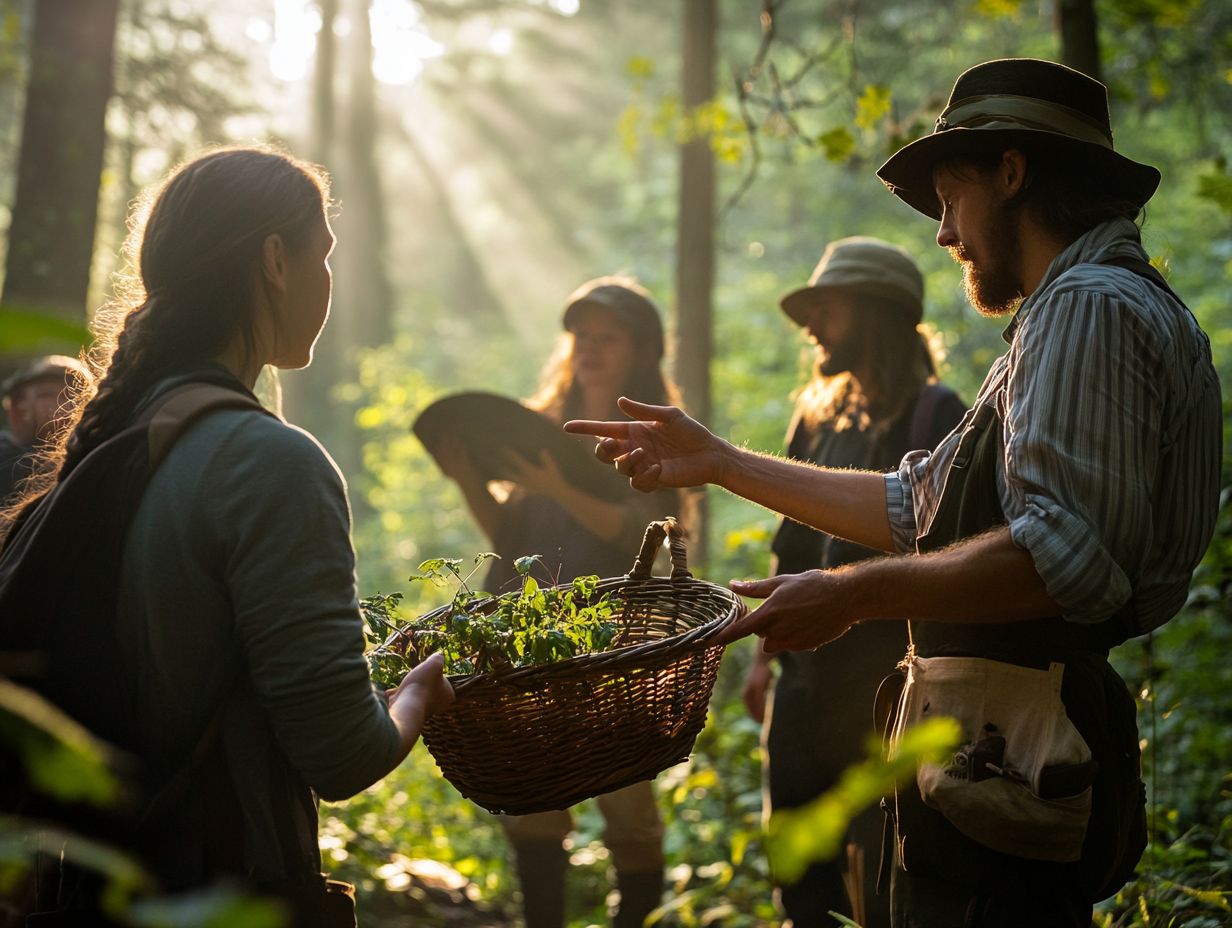
Teaching workshops and classes focused on foraging offers you invaluable hands-on learning experiences, enhancing your skills in identifying edible plants and understanding their nutritional benefits.
These sessions typically cover a wide array of topics, ranging from the fundamentals of local ecosystems to advanced techniques for distinguishing safe edibles from their look-alikes. You will learn identifying mushrooms and plant identification. You can anticipate acquiring practical foraging tips that you can effortlessly apply within your own community, transforming foraging into not just a delightful hobby, but a valuable skill set.
Collaborating with local herbalists elevates the learning experience, providing you with insights into the medicinal uses and preparation methods of various plants. By participating in these workshops, you gain the confidence to explore your surroundings, deepen your connection with nature, and even contribute to local efforts to protect the environment.
Creating Online Resources
Creating online resources like blogs, social media platforms, and digital guides is an excellent way for you to share your foraging knowledge and connect with a wider audience eager to learn about wild edibles. If you’re looking for more insights, check out what resources can help me with foraging.
The availability of plant identification apps and specialized websites can significantly enhance your foraging experience by giving you instant access to accurate information. With these tools, you can identify various species quickly by uploading photos or browsing through extensive databases, making it easier for you to distinguish between safe and toxic plants.
Online groups where you can share and learn foster collaboration and knowledge-sharing, allowing you to ask questions, share experiences, and learn together with others while exploring wild food adventures. This supportive network not only educates the community but also instills confidence in you as you explore the diverse bounty of nature.
Organizing Foraging Groups and Events
Organizing foraging groups and events in your local area is an exciting opportunity to unite individuals who share a passion for wild food adventures, including wild mushrooms and consuming insects, while providing hands-on learning experiences.
By creating a platform for enthusiasts to connect, these gatherings build a vibrant community and enhance the exchange of valuable knowledge about local ecosystems and edible plants, which can include pine nuts and herbalism courses. You can utilize social media or local bulletin boards to promote upcoming foraging trips, ensuring a wide array of participants. For more information, check out these tips for starting your own foraging group. Take, for instance, the successful monthly wild mushroom hunt in the nearby woods; it exemplifies how participants benefit from the insights of seasoned foragers, honing their skills while forming lasting friendships.
These collective experiences not only enrich your understanding but also cultivate a deeper appreciation for nature’s bounty and sustainable practices.
Challenges and Solutions for Sharing Foraging Knowledge
Sharing foraging knowledge can present several challenges. You may encounter difficulties in accessing resources, tackle the spread of misinformation, and prioritize safety by establishing effective guidelines. Learning how to use foraging to educate others can help overcome these obstacles.
Overcoming Barriers to Accessibility
Overcoming barriers to accessibility in foraging initiatives can significantly enhance participation, allowing a broader audience to tap into the wealth of knowledge within the community.
By introducing diverse resources think multilingual guides, visual aids, and interactive workshops you can cater to varying learning preferences and backgrounds, ensuring no one is left behind. It’s essential to focus on underserved communities, which often encounter additional challenges in accessing nature and its resources, as this approach fosters true inclusivity.
Community foraging events serve as a bridge, connecting seasoned foragers with novices while creating a vibrant space for cultural exchange and environmental stewardship. Forming partnerships with local schools and community centers can amplify your outreach, guaranteeing that everyone has the chance to engage with and learn from nature’s bounty.
Addressing Misinformation and Safety Concerns
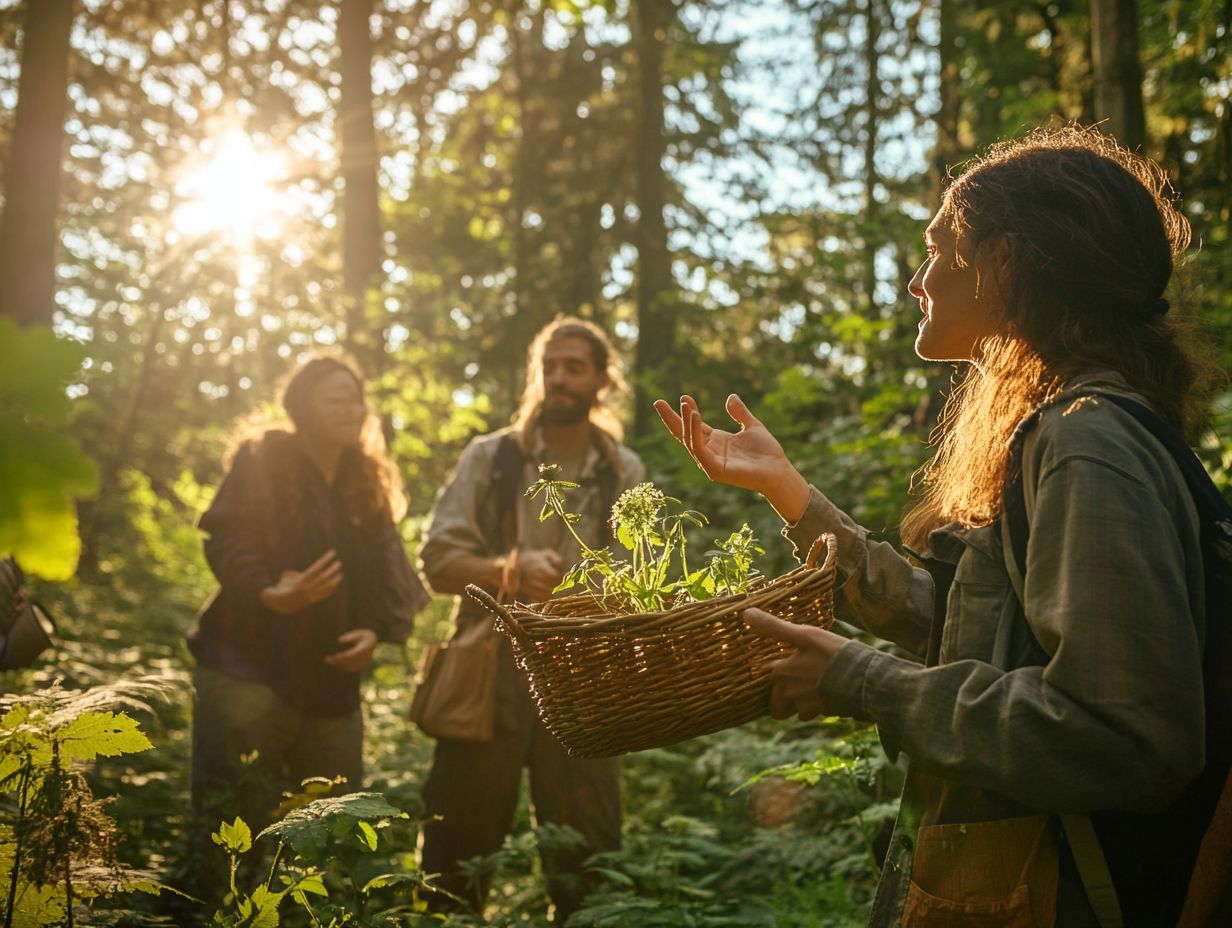
Addressing misinformation and safety concerns is vital for anyone involved in foraging. This is especially true when identifying plants and recognizing potentially hazardous wild mushrooms.
As a foraging enthusiast whether you’re an experienced pro or just starting out you often find yourself navigating a confusing landscape of information. Incorrect advice can lead to perilous situations. That’s why developing a solid foundation in accurate plant identification is vital, not only for your safety but also for nurturing a responsible foraging community.
By prioritizing education and participating in workshops led by expert mycologists who study fungi and botanists who focus on plants you can acquire invaluable skills to distinguish between edible plants and their toxic counterparts. It’s equally important to communicate specific safety precautions, like wearing gloves when handling unfamiliar plants, carrying a reliable field guide, and adhering to local foraging regulations. These actions minimize risks and promote sustainable practices that benefit everyone involved.
Fostering this awareness ultimately deepens your connection with nature and enhances the foraging experience for all.
Ethical Considerations for Sharing Foraging Knowledge
Ethical considerations are paramount when it comes to sharing foraging knowledge. It’s essential to respect indigenous wisdom and uphold sustainable practices, including understanding how to use social media for foraging tips.
Understanding how foraging affects local plant communities is crucial. It helps foster a responsible foraging culture and can be supported by various foraging resources.
Respecting Indigenous Knowledge and Land Rights
Respecting indigenous knowledge and land rights is crucial for ethical foraging practices. This respect acknowledges the cultural heritage and traditional ecological wisdom of indigenous communities.
By actively engaging with these communities, you can gain invaluable insights into sustainable practices that not only benefit the environment but also honor time-honored traditions. For example, collaborating with local tribes in the Pacific Northwest can lead to harvesting techniques that protect critical ecosystems while utilizing traditional methods passed down through generations. This approach preserves biodiversity and elevates the voices of indigenous peoples in the conversation about land stewardship.
When ethical foraging is undertaken in consultation with indigenous communities, it transforms the activity into a profound act of respect and collaboration.
Sustainable Foraging Practices
Sustainable foraging practices are essential for maintaining ecological balance and ensuring that wild food resources remain accessible for future generations.
These techniques help keep nature healthy and ensure that wild foods are available for everyone in the future. As a forager, you play a vital role in plant care by recognizing which species flourish in your local environment. This allows you to harvest in a way that doesn t deplete resources.
By focusing on invasive species, you contribute to managing those plants that threaten native ecosystems, enhancing resilience and biodiversity. Engaging actively with nature and employing these mindful techniques enables you to contribute to the overall health of your habitats, which includes learning about insects and how they intersect with wild food, ensuring that both plants and animals can thrive together in harmony.
Frequently Asked Questions
What is foraging knowledge?
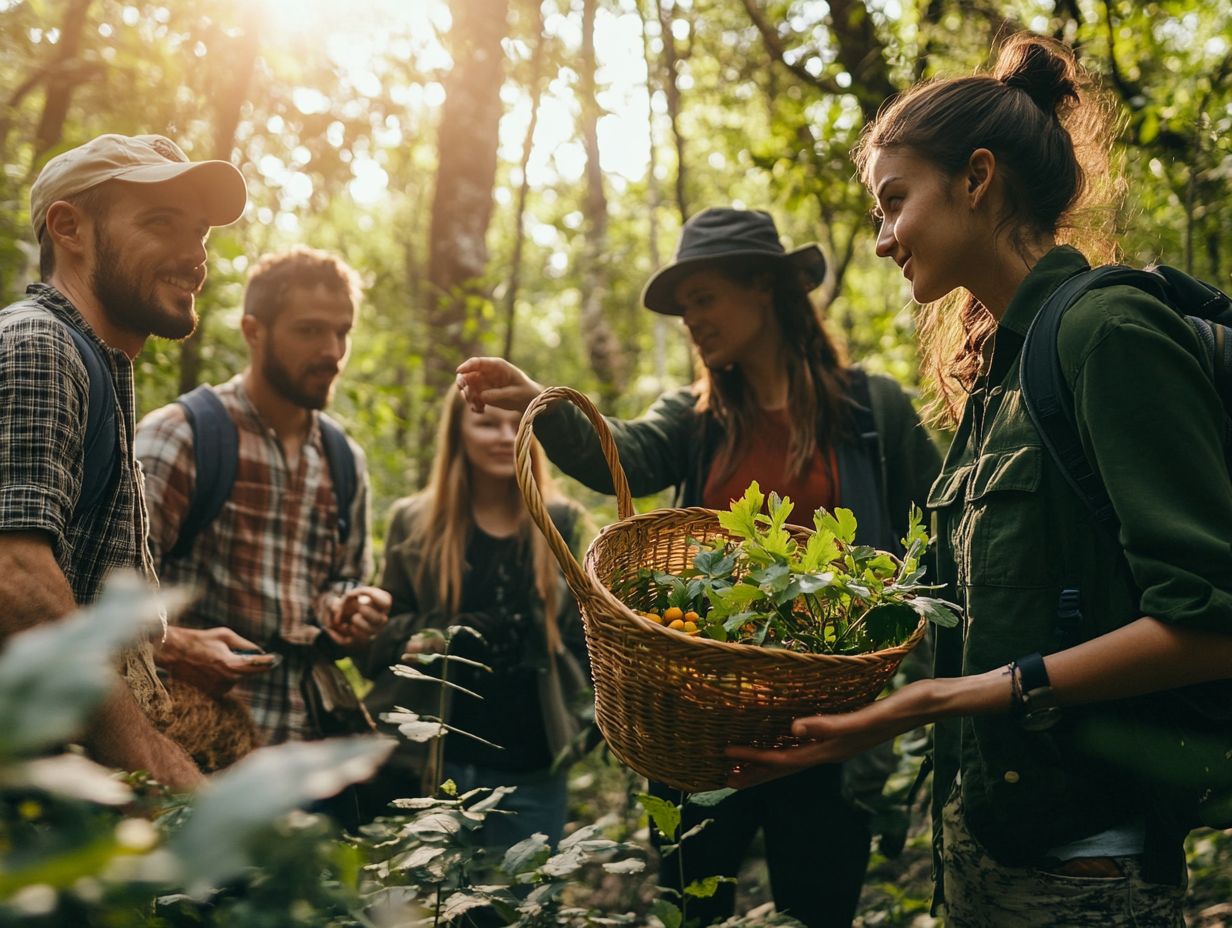
Foraging knowledge includes the skills needed to find, identify, and use wild plants and mushrooms for food, medicine, and more.
Sharing foraging knowledge helps preserve old ways and cultural heritage. It also promotes sustainability and self-sufficiency, making it important to learn how to spread awareness on foraging techniques.
Teach others through hands-on demonstrations or workshops. You can also create written or visual resources like books, videos, or social media posts.
What are some tips for teaching foraging knowledge to beginners?
Start with the basics, such as plant identification and safety precautions. Encourage beginners to focus on easy-to-identify plants before moving on to more complex techniques.
Continuously educate yourself and stay updated on new developments in foraging. Consulting experienced foragers or reliable sources will help ensure you share correct information. Additionally, learning how to teach kids about foraging can enhance your knowledge. Joining a local foraging group can provide real-time learning and support.
What are some potential risks of sharing foraging knowledge with others?
Be mindful of the potential risks, such as over-harvesting. Teach sustainable foraging practices and consider promoting ethical foraging in your community, and always check local laws before sharing knowledge.

